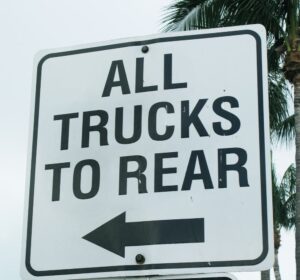Rear-End Truck Accidents
Rear-End Truck Accidents
Rear-end truck accidents can be incredibly dangerous. The main reason is that most commercial trucks, such as semis and tractor-trailers, are far heavier and larger than passenger vehicles. When a truck rear-ends a smaller vehicle, the impact can cause significant damage and serious injuries, including fatalities.
If you suffered injuries or lost a loved one in a truck accident in California, you should consult a truck accident attorney near you for advice about your rights and options to pursue compensation.
Schedule a Free Initial Consultation
What Are the Main Causes of Rear-End Truck Accidents?

Rear-end truck accidents can result from a variety of factors, often involving a combination of human error, environmental conditions, and mechanical issues.
Here are some of the main causes of rear-end truck accidents:
- Following Too Closely (Tailgating): One of the most common causes of rear-end truck accidents is a truck driver following the vehicle in front too closely. This reduces the driver’s reaction time and increases the risk of a collision if the lead vehicle stops suddenly.
- Distracted Driving: Distractions, such as using a cellphone, adjusting the radio, or other activities that take a driver’s attention away from the road, can contribute to rear-end accidents.
- Driver Fatigue: Truck drivers often face demanding schedules and long hours on the road. Fatigue can impair a driver’s concentration, reaction time, and overall ability to operate the vehicle safely.
- Speeding: Driving at excessive speeds reduces the time a truck driver has to react to sudden stops or changes in traffic conditions, increasing the likelihood of a rear-end collision.
- Inadequate Training: Inexperienced or improperly trained truck drivers may struggle to handle the complexities of operating a large commercial vehicle, leading to mistakes and accidents.
- Poor Weather Conditions: Adverse weather conditions, such as rain, snow, ice, or fog, can contribute to reduced visibility and slippery road surfaces, making it more challenging for truck drivers to stop in time.
- Brake Failures: Mechanical issues, particularly brake failures, can prevent a truck from slowing down or stopping as intended, increasing the risk of a rear-end collision.
- Inadequate Maintenance: Improper maintenance of the truck’s braking system, tires, and other critical components can lead to malfunctions and accidents.
- Sudden Lane Changes: Abrupt lane changes by either the truck driver or the driver of the lead vehicle can catch the other off guard and result in a rear-end collision.
- Traffic Flow Issues: Problems with traffic flow, such as congestion or sudden slowdowns, can increase the risk of rear-end accidents, especially if a truck driver is unable to adjust to changing conditions.
- Hazardous Road Conditions: Poorly maintained roads, construction zones, or debris on the road can contribute to accidents, particularly if truck drivers are unable to navigate such conditions safely.
Common Injuries in Rear-End Truck Accidents
The physical consequences of rear-end truck accidents can be severe and life-altering. The injuries associated with truck accidents are typically more serious due to the force of such a heavy vehicle colliding with a smaller car.
Some common rear-end truck accident injuries include:
- Whiplash: Whiplash is a common injury people sustain in rear-end truck accidents. It’s caused by the sudden jerking motion of the head and neck upon impact. Whiplash can lead to neck pain, stiffness, headaches, and decreased range of motion.
- Spinal Injuries: The forceful impact of a rear-end collision can result in spinal injuries such as herniated discs, fractures, or damage to the spinal cord. These injuries can cause severe pain, numbness, tingling, and even paralysis.
- Head and Brain Trauma: The head is vulnerable to injury in rear-end truck accidents. Traumatic brain injuries (TBIs) can occur due to the head striking the steering wheel, dashboard, or window. Concussions, contusions, and even more severe brain injuries can result.
- Fractures and Broken Bones: The impact of a rear-end truck accident can cause fractures and broken bones throughout the body. Common fractures include broken ribs, arms, legs, or collarbones.
- Cuts and Lacerations: The shattered glass and debris from a collision can cause deep cuts and lacerations, leading to significant blood loss and potential scarring.
These are just a few examples of the injuries commonly seen in rear-end truck accidents. The severity of the injuries can vary depending on the speed of the collision, the size of the vehicles involved, and other factors. Seeking immediate medical attention and working with healthcare professionals experienced in treating accident-related injuries is crucial to ensure proper diagnosis, treatment, and rehabilitation.
Legal Options for Rear-End Truck Accidents

When it comes to rear-end truck accidents, understanding your legal options is crucial. If you’ve been involved in such an accident, it’s important to seek legal counsel to navigate the complex legal process and protect your rights.
The first step in pursuing your legal options is to consult with an experienced personal injury attorney who handles truck accident claims. They will guide you through the process of filing a claim and help you build a strong case against the responsible party. It’s important to act quickly, as there are time limitations for filing a claim.
During the legal proceedings, your attorney will gather evidence, such as accident reports, medical records, and witness statements, to support your case. They will negotiate with the insurance companies involved and work diligently to secure the compensation you deserve.
You may be eligible for various types of compensation, including medical expenses, lost wages, pain and suffering, and property damage. The amount you can recover will depend on the details of your case and the extent of your injuries.
Seeking Medical Attention After a Rear-End Truck Accident
After a rear-end truck accident, seek immediate medical attention. Even if you feel fine at first, some injuries may not appear until hours or even days after the accident. Delaying medical attention can have serious consequences for both your health and any potential legal claims you may file in the future.
When seeking medical attention, document all your injuries. This includes taking photographs of visible wounds or bruises and keeping a detailed record of any physical pain or discomfort you experience. These records can serve as evidence later and help support your claim if necessary.
Additionally, seek proper treatment for your injuries. Even seemingly minor injuries can develop into more significant problems if left untreated. By promptly consulting with a healthcare professional, you can identify any underlying issues and receive appropriate care.
Delayed medical attention can have long-term effects on your health and well-being as well as any legal actions you wish to pursue. Injuries that are not promptly diagnosed and treated may worsen over time or lead to chronic pain and lasting disabilities. By seeking medical attention right away, you can ensure that potential issues are identified and addressed early on, giving you the best chance at a full recovery. You will also have documentation of your injuries and treatment, which are necessary for filing an injury claim.
If you experience any symptoms or discomfort after a rear-end truck accident, do not hesitate to seek medical attention. By doing so, you are not only safeguarding your health but also laying the foundation for any potential legal claims you may pursue. As soon as you receive treatment for your injuries, consult a personal injury attorney in your area to discuss your options for seeking compensation.
Insurance Considerations for Rear-End Truck Accidents

Here are some important insurance considerations when dealing with the insurance process after a rear-end truck accident:
- Contact Your Insurance Company: Notify your insurance company about the accident as soon as possible. Provide them with all the necessary details, including the location, date, and time of the incident.
- Document the Accident: Keep thorough records of the accident, including photographs of the scene, damages to your vehicle, and any injuries sustained. This documentation will support your insurance claim.
- Understand Coverage Limits: Review your insurance policy with your attorney to understand the coverage limits for rear-end truck accidents. It’s important to know what expenses your insurance will cover and the extent of compensation you may be eligible for.
- Cooperate with Insurance Adjusters: Expect to hear from insurance adjusters who will investigate the accident. Provide them with truthful and accurate information, but avoid admitting fault. Consult an attorney before giving any official statements.
- Be Aware of Time Limits: Insurance claims have statutes of limitations, so be mindful of deadlines for filing your claim. Acting promptly can maximize your chances of receiving the compensation you deserve.
- Appeal Denied Claims: If the insurance company denies your claim, don’t lose hope. Consult your attorney to explore options for appealing the decision and pursuing the compensation you are entitled to.
Remember, speak with legal professionals who handle rear-end truck accidents to ensure you receive the proper guidance throughout the insurance process. Insurance companies don’t want to pay on claims if possible since it eats into their profits. They may try various methods to reduce your claim or blame you for the accident.
If the insurance company does accept your claim without dispute, they’ll likely offer you a low-ball settlement offer that doesn’t cover your injuries and losses.
Having an attorney on your side can help ensure the insurance company treats you fairly. A lawyer can also negotiate with the insurer to try and get a fair settlement. If the insurance company refuses to offer a fair settlement or denies your claim unjustly, your lawyer can file a lawsuit on your behalf and fight for you in court to get the money you need.
When Should I Contact an Attorney After a Rear-End Truck Accident?
Following a rear-end truck accident, especially one that involves injuries or fatalities, it’s important to contact an experienced truck accident attorney as soon as possible. One of the main reasons has to do with the statute of limitations for personal injury lawsuits.
For instance, California’s statute of limitations allows you only two years from the date of the accident to file a lawsuit in civil court to seek damages. If you fail to have an attorney file suit for you within that time, you risk losing your right to pursue compensation. Claims against government entities have far shorter deadlines, which may be only six months from the date of the accident.
You also want to contact a lawyer before you speak with any insurance company about the accident, including your own. An attorney can inform you of your rights and fight to protect them as well as deal with all communications from the insurer to ensure you don’t inadvertently say something that jeopardizes your case.
A lawyer can also assess your claim, gather evidence, and work to establish liability to the at-fault parties. Truck accident claims typically involve several parties, and you need the skills and resources of an experienced truck accident lawyer to help you hold them accountable.
Contact a Rear-End Truck Accident Lawyer Today

Greg Bentley & Keith More Truck Accident Attorneys
If the negligent actions of a truck driver caused a rear-end truck accident that injured you or a close family member, reach out to a dedicated personal injury attorneys at Bentley & More LLP today for a free consultation.
We can help you navigate the complexities of your case, pursue fair compensation, and provide the support you need during this challenging time. Contact us by calling (949) 870-3800 to request a free case evaluation.


